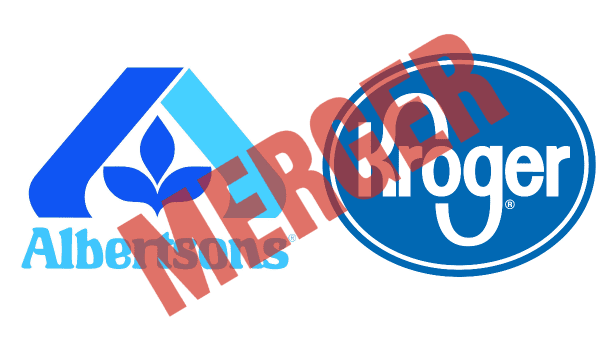It can be enjoyable to watch the ping-pong game that is the discussion of the proposed Kroger-Albertsons supermarket merger.
At one end of the table: Scott Moses, a merger and acquisitions advisor to investment firm Solomon Brothers. Moses contends that the grocery business has changed over the past 20 years, because discount grocers, dollar stores, and online grocers have taken a great deal of the market from supermarket grocers.
To be specific, a discount grocer is a Walmart or a Costco. An online grocer is an Amazon. A dollar store is, rather obviously, a Dollar General.
Over the past two decades, “national/discount grocers added 38,000 stores, doubling their store base and undermining the less than 26,000 supermarkets left,” says Moses. “The national/discount grocers, all non-union, have over 60% grocery share and there are still no national supermarket grocers”—a lack that the proposed Kroger-Albertsons merger would remedy.

Moses makes many other points, but he saves the biggest one for the last: “Kroger’s made some clear commitments: no store closures; no front-line job losses. Period, full stop. More price investment; $1 billion for better wages; donating 10 billion meals to combat food insecurity. Look, I’ve known [Kroger CEO] Rodney McMullen for nearly 20 years; I’ve known [Albertsons CEO] Vivek Sankaran for years as well. These are honorable people. To me, their word counts.”
Moses does note this interesting fact: “I’m also part of the team advising Albertsons on the pending merger.”
On the other end of the ping-pong table: the National Grocers Association (NGA), speaking for independent grocers: an industry segment that Moses, for some peculiar reason, does not bring up. The NGA has gone on record as opposing the merger.
In a statement issued last week, the NGA set out its recommendations for the Federal Trade Commission (FTC) on its proposed merger guidelines. Without going into detail, we can simply say that if Moses sees supermarket chains, like Kroger and Albertsons, as little guys fighting gargantuas such as Walmart and Costco, the NGA feels exactly the same way about Kroger and Albertsons.
NGA contends: “In the United States, wholesale prices offered to independent grocers’ wholesalers can often be higher than observed retail prices at large national chains. This is despite the fact that these independent wholesalers purchase billions of dollars of product by the truckload and operate their own warehouses and logistics networks—offering suppliers the same efficiencies and cost savings that the national chains offer.
“Yet suppliers refuse to offer independent wholesalers the same terms extracted by the largest buyers. The fact that this discrimination in terms and price is not justified by efficiencies is further evidence that it is driven by naked buyer-side market power.”
Consequently, NGA contends that the FTC’s proposed rules are not as strong as they ought to be—although they are much stronger than merger policies have been in both federal administrations and courts over recent decades.
If the Federal Trade Commission rules against the merger, we can expect lawsuit after lawsuit challenging the decision, dragging out the process for a couple of years.
Hence the outcome of the Kroger-Albertsons merger may well depend on the presidential election next year. If President Biden is reelected, the federal government may be expected to continue its hard line on mergers.
If a Republican is elected, we might see what happened with Microsoft at the turn of the century. The Clinton administration brought an antitrust suit against the company in 1998; court rulings went back and forth; but in September 2001, the George W. Bush administration reached a settlement with the software giant that did not require it to break up.
We could see a replay of this turnaround depending on the 2024 election.



